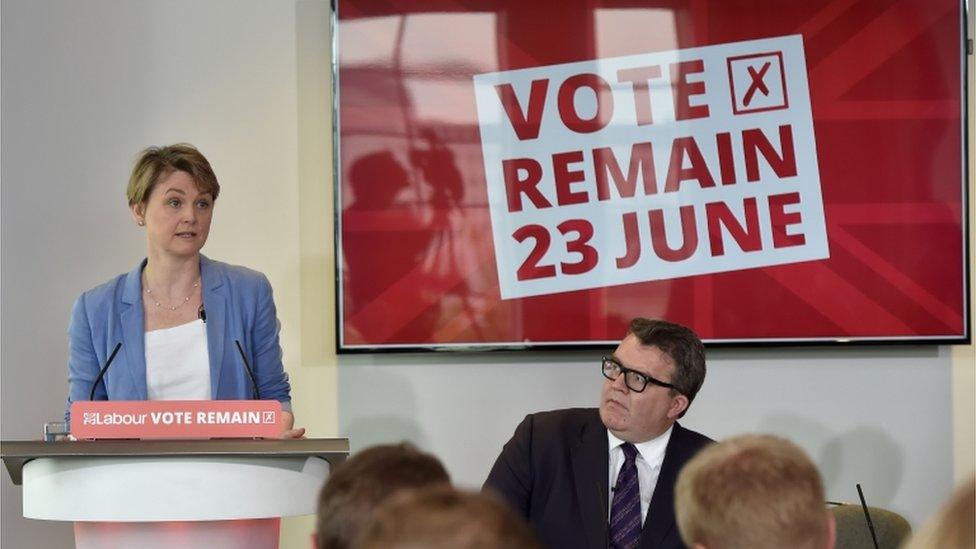EU referendum: Labour urges its voters not to back Brexit
- Published
- comments

Many Labour voters don't know the party backs remaining in the EU and it could lead to a Leave vote in the referendum, senior party figures have warned.
Former leader Ed Miliband said the referendum result was "in question" and urged Labour supporters not to use it as a protest vote against the Tories.
The party's top brass is warning Labour voters would be hit hardest by Brexit.
But backbenchers John Mann and Dennis Skinner have both rejected the official position and joined the Out campaign.
Mr Mann said Labour voters disagreed with the party leadership on the EU issue and a "people's revolution is underway".
Reality Check: Would Brexit mean £18bn of welfare cuts and tax rises?
Writing in the Telegraph, security minister and Leave campaigner John Hayes said Britain is better placed to fight terrorism outside the EU, external
More than 430,000 people applied to register to vote during the extended deadline period
Labour MP John Mann to vote for Brexit
UKIP leader and Leave campaigner Nigel Farage will be grilled by Andrew Neil at 19:30 on BBC One
Labour's deputy Tom Watson and other senior party figures said a further £18bn of spending cuts and tax rises would be in the pipeline. should the UK leave the EU.
The figure - dismissed as "fanciful" and "ridiculous" by Vote Leave - is based on Labour's claim that a post-Brexit Conservative government would "look to announce further austerity if they are to balance the books by the end of the Parliament" - due to their predicted "hit to the UK economy" of a Leave vote.
Mr Watson said Labour was "clear that Britain is better off in Europe" and said that a "Tory Brexit budget" would "hit working people hard" while Ms Cooper said the Leave campaign was "being led by the hard right of the Tory party" who had "never been friends to public services or low-paid workers".
But Vote Leave's Michael Gove, said it was "pure Project Fear" from Labour who were "trying to scare people" into voting to remain in the EU: "Many of the people who say that we will suffer economically if we're outside the EU were the same people who said we had to be inside the euro. They were wrong then, they're wrong now."

Analysis by the BBC's political correspondent Iain Watson
Vote Leave often accuse the Remain campaign of perpetuating Project Fear - but the people who are currently very scared are senior figures in the Labour Party and this is why.
Shadow cabinet members have been monitoring how the campaign has been going
Initially their fear was that their message wasn't getting across - that only about half of Labour voters realised the parliamentary party was overwhelmingly for Remain. But this concern has been eclipsed in recent days by a much bigger fear
Senior figures have been talking to election agents across the country and they have been shocked to find that support for Brexit is higher than previously anticipated.
In other words there were areas with high UKIP support at the last election, and where Labour expected a high Brexit vote. But the evidence they are seeing is that these areas are even more inclined to back Brexit than previously anticipated.
And just as worrying is that areas which were expected to go firmly for Remain are tending to look like they will be more weakly in favour of staying in the EU. There will be a big shadow cabinet push next week, but some fear it's too late.

There have been reports, external suggesting that many Labour voters do not realise the party is in favour of remaining in the EU.
BBC political editor Laura Kuenssberg said several senior figures had told her they were genuinely worried that many Labour voters would vote to leave the EU.
Mr Watson said the "Labour Party is about as united as it possibly can be in asking people to Remain" but added: "The one thing that does concern me is that the polls seem to say that about 40% of Labour supporters don't yet know our position ... There are two weeks to go, we need to get that message out."
Tap here, external to enter your postcode.
He welcomed Labour MP Khalid Mahmood, who has previously backed the Leave campaign, but has now switched to Remain.
Shadow Business Secretary Angela Eagle urged Labour voters not to use the 23 June referendum to give the Remain-supporting Conservative government a "bloody nose" while former party leader Ed Miliband said: "This is not a referendum on David Cameron".
Speaking to BBC Radio 4's Today programme, Mr Miliband said the outcome of the referendum was "in question" adding: "That's why the Labour message has got to be heard, and I think so far not enough of our voters have heard that we are for in, and for Remain."
Ed Miliband says Labour argument is not the "sexy part" of referendum campaign
Kate Hoey claims more Labour MPs will publicly back the UK leaving the European Union.
He added: "We haven't done enough yet, we've got to do more. But people know where Labour stands."
Shadow home secretary Andy Burnham told BBC Two's Newsnight: "We have definitely been far too much Hampstead and not enough Hull in recent times and we need to change that. Here we are two weeks away from the very real prospect that Britain will vote for isolation."
But Mr Mann, MP for Bassetlaw, in Nottinghamshire, told the BBC on Friday: "It's not that Labour's not getting its message across, it's that Labour voters are fundamentally disagreeing."
Single market row
And former Labour minister Frank Field, who is also campaigning for a Leave vote, warned that the party risked losing votes to UKIP with its Remain stance. He said the party should be encouraging supporters to vote "as they believe is in the best interests of our country" instead.
"In trying to scare Labour voters to back Remain, our leadership is on course to lose another one million votes to UKIP, just as we did in 2015," said Mr Field.
In a separate development, Germany's finance minister Wolfgang Schauble told German newspaper Der Spiegel that Britain could not have the benefits of the single market without being an EU member.
"That won't work," Mr Schauble told the newspaper. "It would require the country to abide by the rules of a club from which it currently wants to withdraw."
Remain campaigner Lord Mandelson said Mr Schauble intervention "finally knocks on the head" one of the Leave campaigns main claims.
But Vote Leave chief executive Matthew Elliott said there was "no question" that Britain would still have access to the single market after Brexit, adding: "It would be perverse of the eurozone to try to create artificial barriers - and would do far more damage to them than to anyone else."
- Published10 June 2016

- Published30 December 2020

- Published29 April 2016
